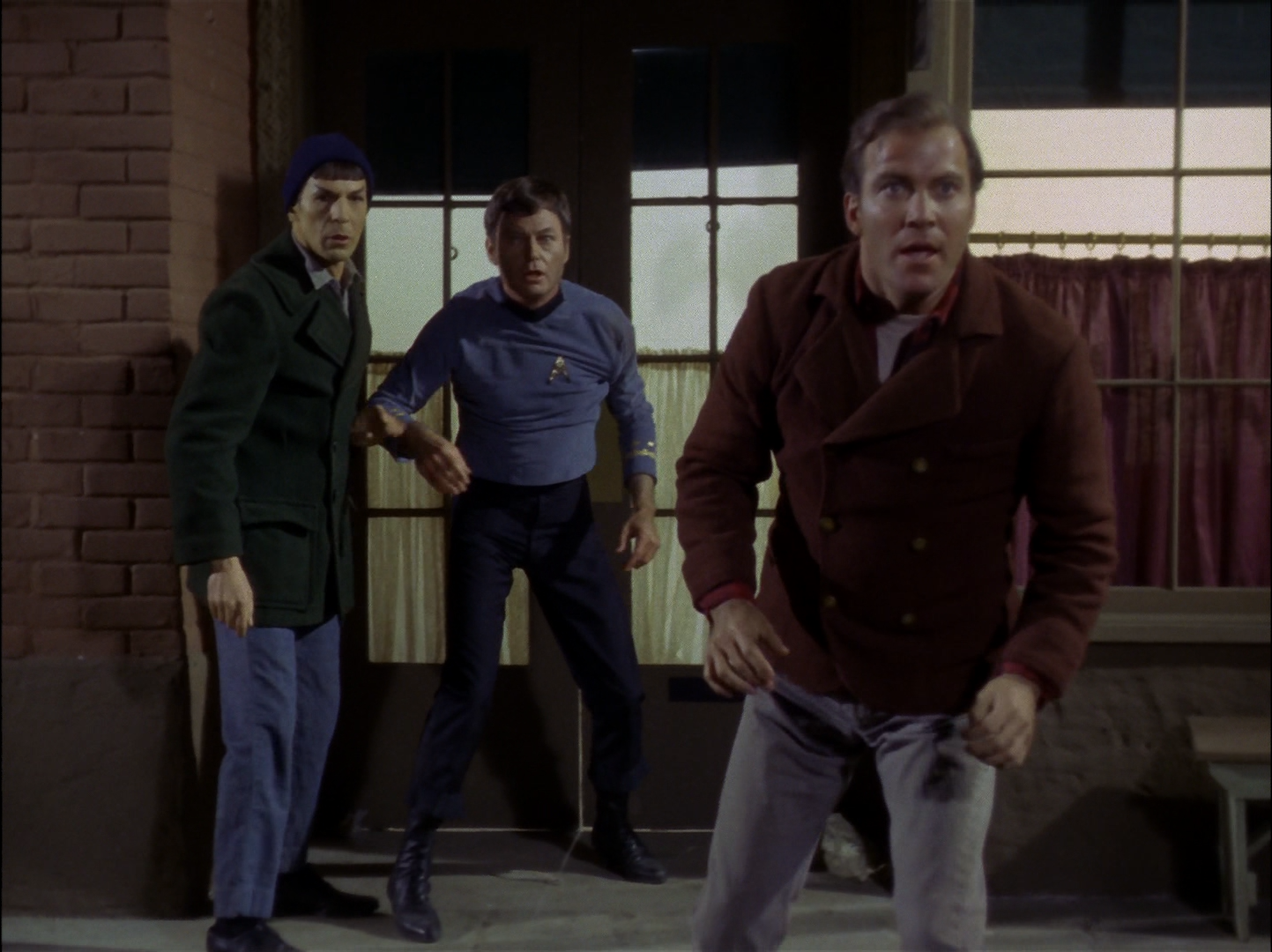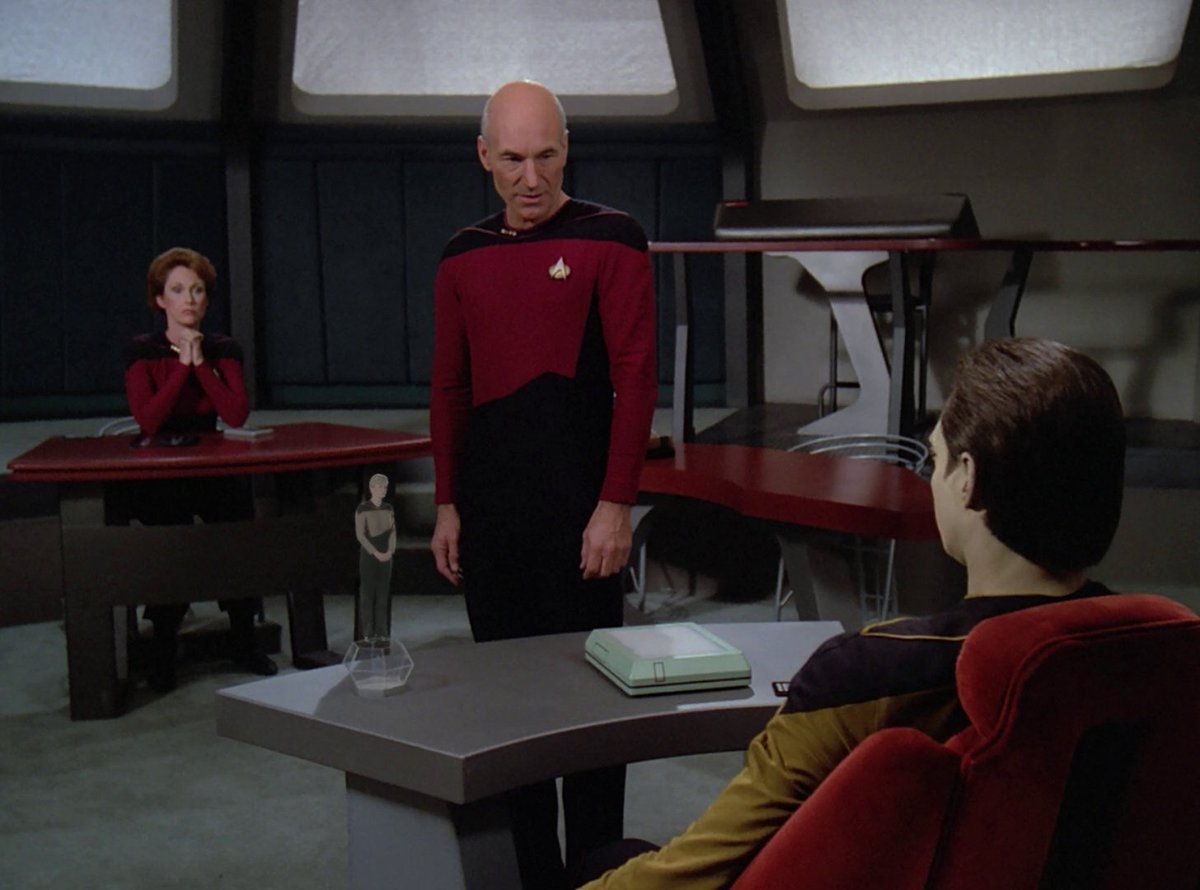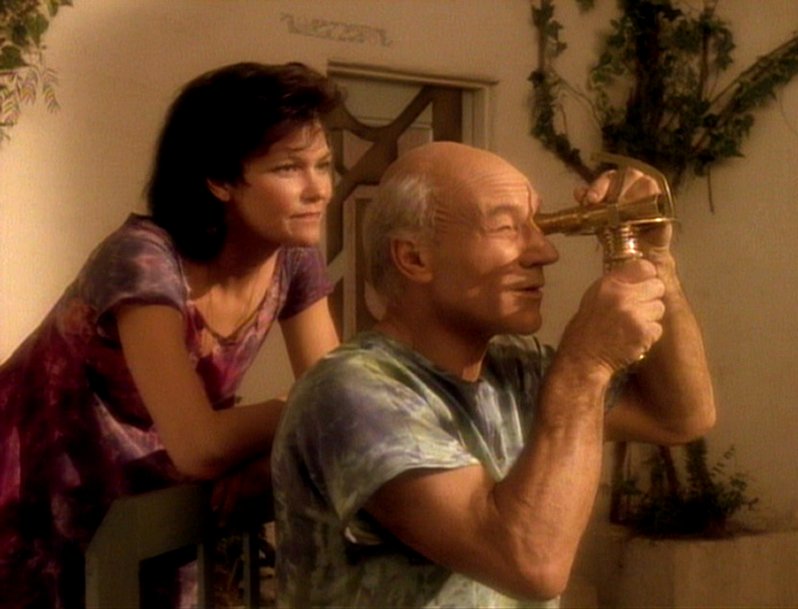Dedicated to my father. Maybe I’ll get him to watch these now that I’ve told the internet what a horrible snob he is.
Star Trek doesn’t always have a stellar reputation. In fact, it’s often associated with schlock, and people who are seen as having an undue interest in it are sometimes looked down on, even by other nerds.
I can think of two possible reason for this. Firstly, as I said in a recent episode of The Fanwankers, this franchise is very uneven. It has the best of Science Fiction, yes, but it also has some of the worse film and television ever made. For ever “The Measure of a Man”, there is a “Tattoo”.
Secondly, like other long running franchises such as Doctor Who or Stargate, there is a lot here. If you hadn’t grown up with it, or been there from the beginning, it can be intimidating. And frustrating.

Well have no fear, The Fandomentals is here! We’ve complied a list that is not only the very best Star Trek, and Science Fiction, have to offer, but also requires very little familiarity with the Star Trek canon to understand and enjoy.
All you really need to know is this: Star Trek takes place in a future Earth where technology and contact with other species has made our lives better. There is no more poverty, war, or prejudice. We travel the stars.
Star Fleet is the organization that features in almost all the Star Trek material. It is not a military, though it has military ranks and it’s militaristic aspects become more prominent as the franchise goes on. They explore space and maintain diplomatic relationships on behalf of the Federation, the democratic government that includes Earth and many other human and alien worlds.
And that’s it really. Let’s dive right in, shall we?
Star Trek: The Original Series
The Original Series is known for it’s campy special effects, and William Shatner’s acting. But the ridiculously low budget often meant that a lot of emphasis was put on storytelling. Certain things have not aged well, especially as social progress has out-stripped Gene Roddenberry’s progressivism, but when TOS is good, man is it good.
The Balance of Terror
Combat is space is often depicted in a very loud way. Lots of lasers and explosions. Think Battle of Midway. But this episode approaches space combat much more like a battle between two submarines. It’s mostly silence, and waiting. Every shot counts. Our heros hardly ever get to actually see the enemy.
This approach is not only probably more realistic, but it gives the script time to focus on character. The relationship between the two commanders is remarkably fleshed out. An excellent example of the old “two gentleman officers respect each other despite trying to kill each other” trope.
City on the Edge of Forever
Another thing Star Trek is known for is time travel, and it all started here. Again, the strength of this story is in the characters and their relationships, although the high concept science fiction idea is definitely present.
 The story centres on the ethical and moral questions that time travel always brings up. Is it right to let a “bad” thing happen because you know it will lead to a “good” consequence. We have this wonderful future, we’re told, but at what price? What can and should that mean to people who are suffering here and now? What right do our heroes have to tell them that their future is “right”?
The story centres on the ethical and moral questions that time travel always brings up. Is it right to let a “bad” thing happen because you know it will lead to a “good” consequence. We have this wonderful future, we’re told, but at what price? What can and should that mean to people who are suffering here and now? What right do our heroes have to tell them that their future is “right”?
The Original Movies
The feature films starring the original crew are probably the best known aspect of the Star Trek canon to the general public. They made Kirk and Spock household names. And they’re also quite uneven. If you want to watch them all, my advice is to just skip I and V.
The Wrath of Khan
It may be surprising to see this movie on this list; after all, it’s the sequel to a rather obscure episode of the original series. But this is the thing that more than anything else, propelled Star Trek into the mainstream. And this is because the story is strong enough to not have to depend on its place in the canon.
 There is a great universality to this story; aging hero forced to finally face his own mortality, and pay for the actions of his youth; a brilliant villain so full of hate that he loses his chance to build a new life; a heroic sacrifice; allusions to great literature; very tense combat that makes the most of a low special effects budget. This isn’t just a good Star Trek movie, it’s a good movie.
There is a great universality to this story; aging hero forced to finally face his own mortality, and pay for the actions of his youth; a brilliant villain so full of hate that he loses his chance to build a new life; a heroic sacrifice; allusions to great literature; very tense combat that makes the most of a low special effects budget. This isn’t just a good Star Trek movie, it’s a good movie.
Star Trek: The Next Generation
The success of the original films prompted another go for Star Trek on the small screen. The first couple of seasons were rough, but the show eventually found its footing and became exceptional, if still uneven.
The Measure of a Man
 Social Commentary is another thing Star Trek is known for. Unfortunately, most of the time this comes off as unforgivably hamfisted. They’re stories about morally superior know-it-alls setting the world straight. Not so here. That may be because the conflict is internal, about a choice characters have to make, rather than an external force that is problematic.
Social Commentary is another thing Star Trek is known for. Unfortunately, most of the time this comes off as unforgivably hamfisted. They’re stories about morally superior know-it-alls setting the world straight. Not so here. That may be because the conflict is internal, about a choice characters have to make, rather than an external force that is problematic.
This is an episode that is very aware of the contemporary implications of itself, the fact that they had a character portrayed by a black actor explicitly make the connection to slavery rather proves that, but once again, a focus on characters and their relationships makes this compelling.
The Inner Light
One of the strengths that episodic television has over the serial format that is more fashionable today is that it provides more opportunities for what are essentially self-contained short stories. The truth is that you need to know nothing at all about Star Trek to view this, the protagonist can be anyone, really. This can lead to questions like, “why is this even on this show?” In fact, the few bits of the regular characters are almost obtrusive, a distraction from the real story.
But the truth is, it’s brilliant. Maybe not wholly original, but who cares, it’s wonderful. Wonderfully acted, wonderfully structured, and wonderfully optimistic. The best possible monument to a civilization is an ordinary life.
If you watch only one thing from this list, make it “The Inner Light”.
Tapestry
This is another episode where Captain Picard is off somewhere and the rest of the the characters play little part. Maybe it’s that Patrick Stewart is so clearly the strongest actor among them that make episodes like this so successful.
 This is a story that celebrates the mistakes in life that make us who we are. It doesn’t glorify them exactly, but it accepts them. The best I can describe it as is a retrospective coming-of-age story. And this is also one of the few times that Q is genuinely rather funny.
This is a story that celebrates the mistakes in life that make us who we are. It doesn’t glorify them exactly, but it accepts them. The best I can describe it as is a retrospective coming-of-age story. And this is also one of the few times that Q is genuinely rather funny.
The Next Generation Films
These films didn’t do nearly as well as the originals, neither with audiences nor with critics. In my opinion, this is largely because they were so focused on making accessible “Sci-Fi Action” movies, that they mostly forgot to make Star Trek movies.
First Contact
This was by far the most successful of the movies feature the Next Generation crew, both with fans, and with the general public. This is because it’s less a Star Trek movie than it is a decent space action movie.
 Like Wrath of Khan, this is despite the fact that the plot and character stuff depends on a particular episode of on the television series. But you don’t have to see “Best of Both Worlds”, all you have to know is that Captain Picard has a history with the Borg, that’s it. And, like all good action movies, it has gaping plot holes that everyone is happy to ignore because it’s all just so damn enjoyable. And it tries to be about something.
Like Wrath of Khan, this is despite the fact that the plot and character stuff depends on a particular episode of on the television series. But you don’t have to see “Best of Both Worlds”, all you have to know is that Captain Picard has a history with the Borg, that’s it. And, like all good action movies, it has gaping plot holes that everyone is happy to ignore because it’s all just so damn enjoyable. And it tries to be about something.
Make some popcorn, get a bottle of beer, and watch it.
Star Trek: Deep Space 9
I make no secret of the fact that this is my favourite Star Trek series. The reason for that is the same reason many don’t like it, it mostly set exploration aside in favour of politics, war, religion, and moral ambiguity. Gene Roddenberry may be rolling in his grave, but this series was at least as ahead of its time as he was.
Duet
If there is any “message show” that tends to be applied with a sledgehammer it’s “genocide is wrong”. Like, gee, thanks, you wise writers, I never would have known that if you hadn’t taught me. In any case, what not only saves this obvious Holocaust-referencing episode, but also makes it one of the greatest pieces in the franchise, is the very unique approach it takes. Its emphasis on forgiveness and its refusal to leave the viewer with any pat answers give it a sophistication that was rather rare.
 The acting is very good, especially for television in the 90s, I must say. The only thing I could possibly say against it is that it’s a little heavy for casual viewing.
The acting is very good, especially for television in the 90s, I must say. The only thing I could possibly say against it is that it’s a little heavy for casual viewing.
In the Pale Moonlight
Full disclosure for the genuine newbies, this episode is a very polarizing one in the Star Trek fandom. There are some who object to it because of how far removed it is for the ideals that the franchise is supposed to be about, a future when humans are virtuous beings. But others, like me for example, would says, “yeah, and that’s why it’s good.”
 The exploration of the “dark side of paradise” was always what this particular show was good at exploring. And the darkness is still, like, very altruistic. Sometimes there is no perfect, conflict-free choice. Sometimes you have to choose between saving the world, or saving your own soul. In this case, knowing the characters and the stakes of the war help, but the story is strong enough, and the writing is good enough, to establish these things well enough that it can more than stand on its own.
The exploration of the “dark side of paradise” was always what this particular show was good at exploring. And the darkness is still, like, very altruistic. Sometimes there is no perfect, conflict-free choice. Sometimes you have to choose between saving the world, or saving your own soul. In this case, knowing the characters and the stakes of the war help, but the story is strong enough, and the writing is good enough, to establish these things well enough that it can more than stand on its own.
Star Trek: Voyager
Voyager tried to return to the format of the original series and The Next Generation, that is, episodic and with a focus on exploration and external conflict. The result is what is generally considered to be the weakest Star Trek series, except for Enterprise, which was so weak I couldn’t even find a single episode to put on this list. (When ENT was good, it was not for newbies.) Still, the series did have its highs.
The Thaw
This is another episode that is just a great science fiction short story. Most of the action takes place off of the ship and the guest star is by far the most interesting part. But, in contrast to some of the other pieces on this list, where most of the regular characters are sidelined, this episode really makes good use of the cast and their strength as actors, and as characters. It’s also a good introduction to how an SF framework can be very effective in exploring very fundamental aspects of the human condition, by putting them in a setting where we are less distracted by our own cultural norms and assumptions. This is especially true in this series, where episodes like this are rather, um, rare.
It’s also a good introduction to how an SF framework can be very effective in exploring very fundamental aspects of the human condition, by putting them in a setting where we are less distracted by our own cultural norms and assumptions. This is especially true in this series, where episodes like this are rather, um, rare.
*
So there they are, Star Trek’s best contributions to the Science Fiction Canon. If these ten works don’t turn you into a Trekkie, nothing will.

